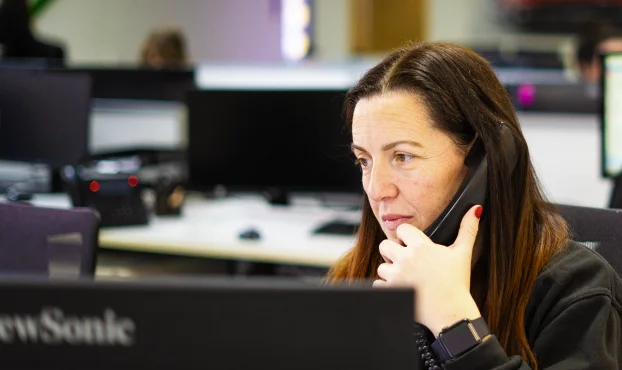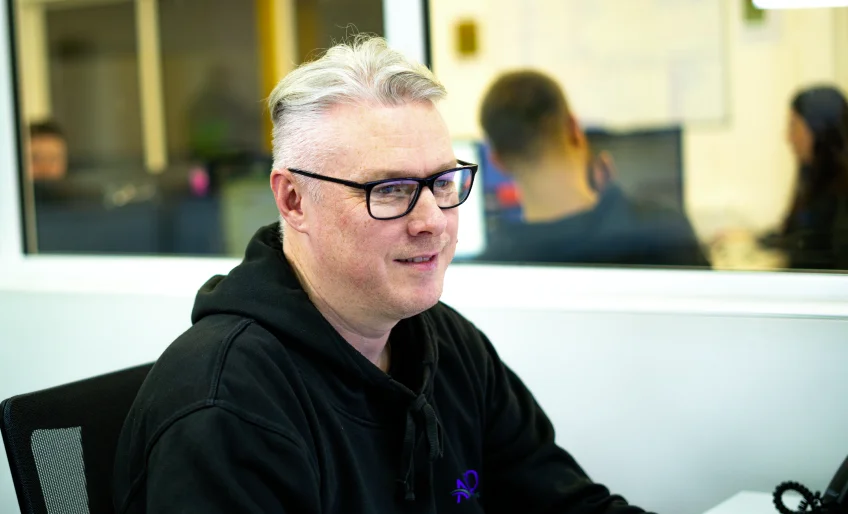We are specialists in non-fault road traffic accidents. Here is our step-by-step guide for you to follow if you've been in an accident that wasn't your fault.

Independent. Trusted. On your side.
We are a non-fault specialist accident management company. We provide practical support and advice, while managing all aspects related to the accident, from roadside recovery to your vehicle’s repairs. Our purpose is to relieve the disruption of a non-fault accident to your daily life.
If you’d like to speak to someone about a non-fault accident...
Call us on 0330 128 1407 or start your non-fault claim online
The benefits of using us, not provided by your insurer:
No policy excess to pay
A comparable replacement vehicle
A dedicated claims handler
No risk to your no claims bonus
BSI Kitemark accredited repair network
The very first thing to do is stop the car safely, if it is not already safely stationary. Make sure to turn it off.
Check yourself, your passengers and anyone else for injuries sustained. Call an ambulance if injuries occur.
At this point, emotions tend to run high. Take a moment to keep calm.
Even a simple apology can be used as an admission of fault. Be respectful but don’t apologise or admit fault.
It’s recommended that no matter the circumstance, the police are made aware of a car accident collision.
A common misunderstanding when people aren’t sure of what to do in a car accident is how and when should the police be brought into the situation.
It is the situation circumstances at hand that will depend on whether you’ll need to call the police immediately or whether you contact them once you leave the scene of the collision.
In certain situations following a non-fault accident, calling 999 is the best option. These include:
If the collision doesn’t require you to call 999, the best course of action is to notify your local police station within 24 hours. You can do this by:
Once the initial shock has subsided and everyone is safe, it is a legal requirement for both drivers to exchange details. This is very important for a successful non-fault claim. These details must include the following:
After the initial shock has passed and you’ve made sure everyone is okay, UK law requires both drivers to share their details.
Exchanging details with the other driver alone is sometimes not enough.
Ensure that all details are exchanged with any and all passengers; both from your own vehicle and importantly from the third-party vehicle as well.
To help build your claim once you have left the road traffic accident scene, witnesses are very important to the success and evidence.
If you have a witness at this point, ensure you collect the witness’s details in full.
Recording detailed information related to an accident is crucial for establishing evidence to unequivocally prove you were not at fault. If you are preparing for potential future incidents, we recommend keeping a small notepad in your vehicle at all times.
Take note of all third-party vehicles involved, including make, model, colour, year, and registration plate.
Take photographs, and if possible videos, of all vehicles, including your own. Make sure to capture damage and positions of vehicles.
In addition to the vehicles, take photographs and videos of the accident scene and surrounding areas.
Make an attempt to fully capture the driving conditions, including lighting, surface quality, weather, etc.
Look around for any buildings with CCTV. Ask if any other vehicles that may have witnessed the accident have dash cam footage.
It's very important to take note of the exact time and date of the accident. Also, any precise timing of events leading up to the accident.
If anyone is injured, make sure to make a note of this. In addition, if people weren't injured, make a note of this also.
Ask witnesses to provide you with a detailed report and note this down. Ask them to sign and date it and collect their details.
If possible, create a visual drawing of how the accident happened. Agree with this with the other driver and ask them to sign.
It's a great idea to create a 'commentary video', walking around and explaining what happened while it's still fresh in your mind.
Auto Claims Assist
First contact after a car accident
Start my claim online Call us on 0330 128 1407After a car accident, extensive visible damage often clearly indicates the need for recovery. However, at times, damage isn’t as apparent.
Operating an unroadworthy vehicle is not only unsafe but also illegal in the UK. If you aren’t sure whether the car is safe, you should avoid driving it to prevent any further risk or complications. When considering accident recovery, the important things to know are:
Checking that your vehicle passes a ‘roadworthy vehicle check’ is the first place to start when considering recovery.
Discover non-fault accident recovery →Avoid contacting your own insurance for recovery. Equally, avoid paying out for a private recovery service. There is a better way, at no cost to you, by working with an accident management company.
Discover non-fault accident recovery →Many instinctively call their insurance after an accident, either to claim or seek advice, as most insurers have dedicated lines for this.
However, if you’re not at fault, directly claiming through your insurer may leave you at a disadvantage. Accident management companies offer an invaluable alternative, handling claims independently to ensure non-fault drivers receive what they’re entitled to with minimal disruption.
If you weren’t at fault for the accident, there is a better alternative. The choice of who you contact first, however, is important to secure your eligibility.
Working with a partner who understands what to do after a car accident is essential. Your dedicated claims handler will initiate a claim on your behalf.
Embark on a hassle-free journey with our dedicated assistance. Let us help you navigate through the complexities, ensuring a smooth and efficient resolution.
Understand the next steps in what to do after a car accident:
Auto Claims Assist
First contact after a car accident
Start my claim online Call us on 0330 128 1407Your Trusted Claims Management Company
“The team at Auto Claims Assist dealt with everything for me, made sure I was never left without a car and it didn’t cost me anything. Would highly recommend!”

15+
Years of expertise
1,000+
36,000+
Successful cases
Our team are ready to discuss the details of your accident and start your non-fault claim.
To get started with Auto Claims Assist, simply call to us on 0330 128 1407 or start your claim online here
To ensure trust, transparency and to exceed industry standards, we adhere to the standards set by the Financial Conduct Authority (FCA), The Credit Hire Organisation (CHO) and The General Terms Of Agreement (GTA).
We are:
Independent to insurers
On your side
Dedicated to delivering an award-winning, exceptional customer experience.
You can feel confident knowing that your claim is being handled professionally by experts.
We’re a UK leading Accident Management Company founded in 2009, helping thousands of people, throughout the country, every year after non-fault accidents. Our team of accident experts have over 15+ years of experience in the complexities of accident claims management.
Don’t just take our word for it. Our customers rate us ‘EXCELLENT’ on Trustpilot. See what they have to say about their experiences with Auto Claims Assist after a non-fault accident:

Our team of non-fault claim specialists are ready to answer any questions you have. Provide your details here to request a callback. One of our advisors will call you back as soon as possible. Alternatively, call us on 0330 128 1407 to speak to someone now.
One of our team will give you a call